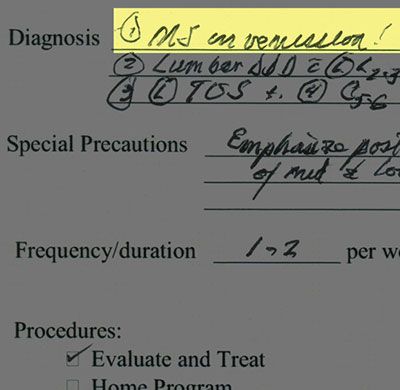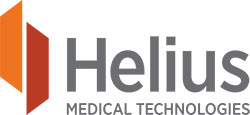Doctor: MS in Remission! (Month +6.75)

I just noticed that on my most recent physical therapy script from my pain neurologist, there's a note to my trainer: "MS in remission!" Yes, he used an exclamation point. It's been 10 months since my last MRIs and 10 months since my last dose of any MS meds. The MRI report came back, "no change."
Yippee.
I further challenged these new results; I went into a hot jacuzzi for 45 minutes, something I wouldn't dare try while in my previous throws of MS symptom hell. There was no effect other than the nice relaxation you'd expect from a comforting soak. This is double proof that my MS is gone!
 I'm still left with the damage MS did to me while it was active. I'm working out regularly on my Total Gym and treadmill to reverse any deficiency I'm able. And there's still pain, albeit less since I've been increasing my "anticonvulsant" medication dosage.
I'm still left with the damage MS did to me while it was active. I'm working out regularly on my Total Gym and treadmill to reverse any deficiency I'm able. And there's still pain, albeit less since I've been increasing my "anticonvulsant" medication dosage.
I've been utilizing the holiday season downtime to focus on targeted exercise. Yesterday, I actually walked two miles, still a little sloppily. While my hip and knee are actually strengthing, and I'm recovering some coordination, my balance is still clearly deficient. According to Dr. Doidge, this, too, can be addressed through neuroplasticity (see previous post). I will likely have to wait for a promising new device, the PoNS from Helius Medical, to become FDA approved before I'm able to effect any significant improvements in that area (clinical trial info here).
I'm doing everything I can.
If my next big push on tegretol doesn't solve my pain issues more permanently, I will consider something called Transcranial Direct Current Stimulation (tDCS). Not to be confused with Transcranial Magnetic Stimulation (TMS), the former has been shown to have a significant effect on permanently reducing CNS neuropathic pain (NP). There was even a study using tDCS for NP, specifically in MS patients. While the process is clearly safe, and home-use units not terribly expensive to purchase, a single course of professional treatment is expensive (five digits!).
https://www.ncbi.nlm.nih.gov/pubmed/20018567
https://www.ncbi.nlm.nih.gov/pmc/articles/PMC4824778/
"Results: Compared to sham, active tDCS yielded significant analgesic effects according to VAS and BPI global scales.There were no effects of any block on mood, fatigue, or attention."
Important Timeframes
- My Stem Cell Transplant Date: June 5th, 2016
- Treatment duration: 4 weeks
- Typical onset of disability reversal: +9 months
- Typical complete recovery from procedure: +1 to +2 years
- Typical maximum reversal of disability: +2 years
Disclaimer
I am not a doctor. I am a scientist (engineer) who has had MS since March 2013.
The website blogs are separated into two sections: the Treatment Blog and the Recovery Blog. Day Zero is when I received my stem cells back.
- Homeward Bound (Day +12)
- Treatment Complete (Day +11)
- Final leg of the procedure (Day +10)
- Healing fast! (Day +8)
- Neutropenia (Day +6)
- Jumped the gun (Day +3)
- Immune System Gone (Day +2)
- DAY ZERO - Got My Stem Cells Back!
- One million stem cells per kilo (Day -2)
- The “Mexican Method” (Day -4)
- Portal to the heart (Day -5)
- Waiting out mobilization, (Day -8)
- Done with first rounds of chemo (Day -9)
- A Rough Night (Day -10)
- Starting chemo now! (day -11)
- An Easy Day (day -12)
- First Major Snafu - The Flight Agent Chronicles
- We’re off
- Countdown to vacate
- Everything's Confirmed
- AHSCT and Progressive MS. Conflicting Studies (Year 6.4) - UPDATED
- Check-In (Year 5.2)
- No New Activity on MRIs (Year 3.6)
- Bloodwork Back To Normal (Year 3.3)
- Why Neurologists in the US Don't Recommend HSCT (Month +35.8)
- Better Pain Management (Month +33.6)
- Final Re-Vaccinations & The Medical Cannabis Primer (Month +32.9)
- "Sustained Decrease in Disability" (+30.6 months)
- No Progression Seen on MRI (Month +29.7)
- Cruising Along (Month +29)
- Nerve Decompression Surgery (Month +21.8)
- Looks Like It Worked (Month +17.2)
- Further Pain Improvements (Month +15)
- Significantly Lower Pain (Month +14.4)
- More Thoughts About MMJ, Meds & Pain (Month +13)
- +1 Years and Counting! (Month +12.6)
- Better & Better (Month +11.5)
- Major Pain Improvements. Finally. (Month +10.6)
- DIMS, SIMS and the Medicine Cabinet in the Brain (Month +9.6)
- Sliding Sideways ( Month +9.2)
- Pain, Pain, Go Away! (Month +8)
- Doctor: MS in Remission! (Month +6.75)
- Neuroplasticity (Month +6.1)
- Hopefully, My Last MRIs, Forever (Month +6)
- Chemobrain (Month +5.2)
- Kickin' and Screaming (Month +5)
- Month +3.7 Progress Report
- Fresh Foods Welcome! (Month +3.2)
- Thoughts About Pain (Month +3)
- Making Good Progress (Week +12)
- First Followup Rituximab Infusion scheduled (Week +9.5)
- Walking Towards Improvement (Day +54)
- Neutrophils Recovering Appropriately (Day +39)
- Less Pain Lately. Horray! (Day +25)
- The Highs & Lows of Recovery (Day +22)